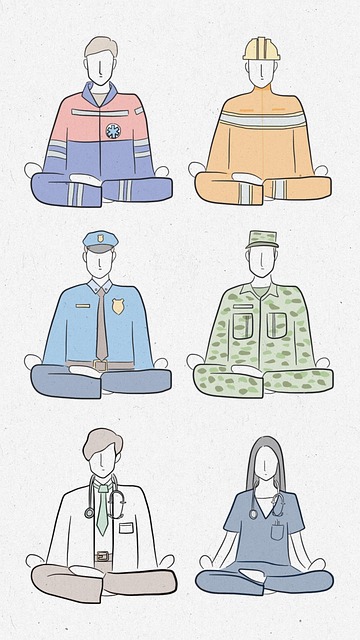Colorado Springs Anger Management Therapy leverages the RFM framework—a simple yet effective tool to foster resilience by understanding emotional responses to challenges. This approach, combined with mindfulness, stress management, and cultural sensitivity, equips individuals to manage anger, improve relationships, and enhance overall well-being. Tailored exercises, regular progress tracking, and data-driven evaluations ensure the program's success in empowering clients to confront life's challenges head-on.
In today’s fast-paced world, building resilience is paramount for mental well-being. This article explores the powerful combination of RFM (Resourceful Fronting Method) and resilience-building exercises, shedding light on their effectiveness in fostering adaptability. We delve into the specific benefits of Colorado Springs Anger Management Therapy as a case study, showcasing its impact on individuals navigating challenging situations. Through a comprehensive step-by-step guide, we empower readers to implement these techniques, ultimately leading to enhanced emotional regulation and improved quality of life. Learn how to measure success and ensure continuous improvement on your resilience journey.
- Understanding RFM and its Role in Resilience Building
- The Impact of Colorado Springs Anger Management Therapy
- Implementing Resilience Exercises: A Step-by-Step Guide
- Measuring Success and Continuous Improvement
Understanding RFM and its Role in Resilience Building

Resilience is a vital asset for individuals navigating life’s challenges, and Recognition, Frequency, and Moment (RFM) is a powerful framework to foster this quality. This simple yet effective model helps individuals understand their emotional responses to various situations, encouraging them to build resilience through mindful awareness. By recognizing triggers (recognition), understanding the frequency of these events, and focusing on the moments that follow, individuals can develop healthier coping mechanisms.
In the context of Colorado Springs anger management therapy, RFM can be a valuable tool. Anger is often a secondary emotion, arising from deeper feelings like fear or hurt. By applying RFM, therapists can guide clients to identify the root causes and patterns behind their anger. This process facilitates emotional healing processes and promotes effective stress management, especially when coupled with cultural sensitivity in mental healthcare practice.
The Impact of Colorado Springs Anger Management Therapy

Colorado Springs Anger Management Therapy has been instrumental in transforming lives by offering effective strategies to manage and reduce anger. This therapeutic approach focuses on empowering individuals to recognize and control their emotional responses, leading to improved relationships and overall well-being. Through a combination of evidence-based techniques, participants learn valuable skills in emotional intelligence, mindfulness meditation, and stress management.
The program’s success lies in its ability to create a safe space for individuals to explore the root causes of anger while providing practical tools for healthy expression. By integrating these coping mechanisms into daily life, participants can navigate challenging situations with heightened self-awareness and composure, fostering more positive interactions and enhancing their resilience.
Implementing Resilience Exercises: A Step-by-Step Guide

Implementing Resilience Exercises: A Step-by-Step Guide
The integration of resilience-building exercises into Colorado Springs anger management therapy programs offers a transformative approach to mental well-being. It’s not just about managing anger; it’s about equipping individuals with tools to navigate life’s challenges. Start by identifying specific areas where clients struggle, whether it be anxiety, depression, or difficulty coping with stress. This involves a collaborative process between the therapist and client, considering individual needs and goals.
Next, choose exercises tailored to these identified areas. For instance, mindfulness practices can help manage anxiety, while cognitive reframing techniques address negative thinking patterns. Incorporate these exercises regularly, ensuring they are accessible and meaningful to clients. Consider cultural competency training for healthcare providers to make sure the chosen methods resonate with diverse backgrounds. Over time, encourage clients to track their progress and reflect on how these practices have empowered them to face life’s obstacles head-on, ultimately fostering resilience.
Measuring Success and Continuous Improvement

Measuring Success is an integral part of any resilience-building program, especially when offering Colorado Springs Anger Management Therapy. By setting clear and achievable goals, therapists can assess progress and tailor exercises to individual needs. Regular assessments allow for continuous improvement, ensuring that the RFM (Resilience, Flexibility, and Mastery) approach remains effective and engaging. This process involves both qualitative and quantitative methods, such as client feedback, observations, and structured questionnaires, to gauge changes in emotional regulation, coping skills, and overall well-being.
For instance, therapists might track reductions in anger-related incidents or the frequency of clients using specific stress management techniques like mindfulness practices or Empathy Building Strategies. The Mind Over Matter Principles can be evaluated through participant self-reports on their ability to reframe negative thoughts and maintain a sense of control during challenging situations. Over time, these measurements provide valuable insights, allowing therapists to refine their approach and offer more targeted interventions for better Stress Management.
In conclusion, implementing RFM (Resilience, Flexibility, and Mastery) exercises, as exemplified by the successful outcomes of Colorado Springs Anger Management Therapy, is a powerful strategy for building resilience. By following the step-by-step guide provided, individuals can navigate challenges more effectively, fostering personal growth and emotional well-being. Continuous improvement, measured through regular assessment, ensures that these exercises remain tailored to individual needs, making them a valuable tool for enhancing overall resilience.














